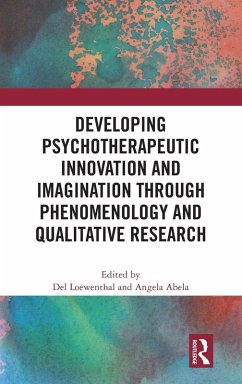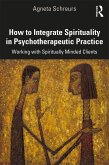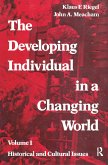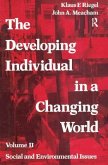Developing Psychotherapeutic Innovation and Imagination through Phenomenology and Qualitative Research
Herausgeber: Loewenthal, Del; Abela, Angela
Developing Psychotherapeutic Innovation and Imagination through Phenomenology and Qualitative Research
Herausgeber: Loewenthal, Del; Abela, Angela
- Gebundenes Buch
- Merkliste
- Auf die Merkliste
- Bewerten Bewerten
- Teilen
- Produkt teilen
- Produkterinnerung
- Produkterinnerung
This book presents contemporary studies in qualitative psychotherapeutic research, examining their effectiveness in developing psychotherapeutic innovation and imagination.The book explores the tension between different forms of therapeutic knowledge.
Andere Kunden interessierten sich auch für
![Psychotherapeutic Change Through the Group Process Psychotherapeutic Change Through the Group Process]() Leonard BlankPsychotherapeutic Change Through the Group Process179,99 €
Leonard BlankPsychotherapeutic Change Through the Group Process179,99 €![Projective Identification and Psychotherapeutic Technique Projective Identification and Psychotherapeutic Technique]() Thomas OgdenProjective Identification and Psychotherapeutic Technique158,99 €
Thomas OgdenProjective Identification and Psychotherapeutic Technique158,99 €![Developing Mental Toughness in Young People Developing Mental Toughness in Young People]() Developing Mental Toughness in Young People151,99 €
Developing Mental Toughness in Young People151,99 €![Countertransference and Psychotherapeutic Technique Countertransference and Psychotherapeutic Technique]() James F. Masterson M. D.Countertransference and Psychotherapeutic Technique159,99 €
James F. Masterson M. D.Countertransference and Psychotherapeutic Technique159,99 €![How to Integrate Spirituality in Psychotherapeutic Practice How to Integrate Spirituality in Psychotherapeutic Practice]() Agneta SchreursHow to Integrate Spirituality in Psychotherapeutic Practice142,99 €
Agneta SchreursHow to Integrate Spirituality in Psychotherapeutic Practice142,99 €![The Developing Individual in a Changing World The Developing Individual in a Changing World]() John A. MeachamThe Developing Individual in a Changing World110,99 €
John A. MeachamThe Developing Individual in a Changing World110,99 €![The Developing Individual in a Changing World The Developing Individual in a Changing World]() Georgy GounevThe Developing Individual in a Changing World168,99 €
Georgy GounevThe Developing Individual in a Changing World168,99 €-
-
-
This book presents contemporary studies in qualitative psychotherapeutic research, examining their effectiveness in developing psychotherapeutic innovation and imagination.The book explores the tension between different forms of therapeutic knowledge.
Produktdetails
- Produktdetails
- Verlag: Routledge
- Seitenzahl: 240
- Erscheinungstermin: 29. September 2025
- Englisch
- Abmessung: 240mm x 161mm x 18mm
- Gewicht: 529g
- ISBN-13: 9781041080688
- ISBN-10: 1041080689
- Artikelnr.: 74446528
- Herstellerkennzeichnung
- Libri GmbH
- Europaallee 1
- 36244 Bad Hersfeld
- gpsr@libri.de
- Verlag: Routledge
- Seitenzahl: 240
- Erscheinungstermin: 29. September 2025
- Englisch
- Abmessung: 240mm x 161mm x 18mm
- Gewicht: 529g
- ISBN-13: 9781041080688
- ISBN-10: 1041080689
- Artikelnr.: 74446528
- Herstellerkennzeichnung
- Libri GmbH
- Europaallee 1
- 36244 Bad Hersfeld
- gpsr@libri.de
Del Loewenthal is Emeritus Professor of Psychotherapy and Counselling at the University of Roehampton, London, UK. He is an existential-analytic psychotherapist, photographer, and chartered psychologist, with a particular interest in phenomenology. Angela Abela is Professor and founding Head of the Department of Child and Family Studies, University of Malta, a clinical psychologist, a UKCP registered family therapist, and a supervisor.
Introduction: Developing psychotherapeutic innovation and imagination
through phenomenology and qualitative research with particular reference to
the nature of therapeutic knowledge 1. Psychotherapeutic research and
practice: Do we need to talk about 'efficacy'? 2. Travelling in time: Using
interpretative phenomenological analysis (IPA) to examine temporal aspects
of the personal experience of issues in health and well-being 3.
Uncertainty and existential thinking 4. Using medical records in
qualitative research: Advantages and limitations 5. Developing reflexivity
and self-compassion in group psychotherapy: A dialogical and narrative
approach 6. Exploring the grief journey of bereaved spouses: Insights into
the impact of sedation within palliative care 7. "Lost in space and time":
Fathers' experiences of preterm birth 8. Body as mediator: Case
understanding in salutogenic-oriented general practitioner consultation 9.
School organisational trauma during student suicide crisis 10. Living with
and living by tattoos: Discursive analysis of a bodily practice 11.
Towards a psychotherapy publishing ethics concordat 12. Wished I'd been
there: Reflections on the special issue's articles as refracted through my
appreciations for qualitative researchers' innovativeness 13. Reading with
love: Developing therapeutic imagination through purposeful engagement with
qualitative research Endnote: The possibility of phenomenology and
psychotherapeutic knowledge?
through phenomenology and qualitative research with particular reference to
the nature of therapeutic knowledge 1. Psychotherapeutic research and
practice: Do we need to talk about 'efficacy'? 2. Travelling in time: Using
interpretative phenomenological analysis (IPA) to examine temporal aspects
of the personal experience of issues in health and well-being 3.
Uncertainty and existential thinking 4. Using medical records in
qualitative research: Advantages and limitations 5. Developing reflexivity
and self-compassion in group psychotherapy: A dialogical and narrative
approach 6. Exploring the grief journey of bereaved spouses: Insights into
the impact of sedation within palliative care 7. "Lost in space and time":
Fathers' experiences of preterm birth 8. Body as mediator: Case
understanding in salutogenic-oriented general practitioner consultation 9.
School organisational trauma during student suicide crisis 10. Living with
and living by tattoos: Discursive analysis of a bodily practice 11.
Towards a psychotherapy publishing ethics concordat 12. Wished I'd been
there: Reflections on the special issue's articles as refracted through my
appreciations for qualitative researchers' innovativeness 13. Reading with
love: Developing therapeutic imagination through purposeful engagement with
qualitative research Endnote: The possibility of phenomenology and
psychotherapeutic knowledge?
Introduction: Developing psychotherapeutic innovation and imagination
through phenomenology and qualitative research with particular reference to
the nature of therapeutic knowledge 1. Psychotherapeutic research and
practice: Do we need to talk about 'efficacy'? 2. Travelling in time: Using
interpretative phenomenological analysis (IPA) to examine temporal aspects
of the personal experience of issues in health and well-being 3.
Uncertainty and existential thinking 4. Using medical records in
qualitative research: Advantages and limitations 5. Developing reflexivity
and self-compassion in group psychotherapy: A dialogical and narrative
approach 6. Exploring the grief journey of bereaved spouses: Insights into
the impact of sedation within palliative care 7. "Lost in space and time":
Fathers' experiences of preterm birth 8. Body as mediator: Case
understanding in salutogenic-oriented general practitioner consultation 9.
School organisational trauma during student suicide crisis 10. Living with
and living by tattoos: Discursive analysis of a bodily practice 11.
Towards a psychotherapy publishing ethics concordat 12. Wished I'd been
there: Reflections on the special issue's articles as refracted through my
appreciations for qualitative researchers' innovativeness 13. Reading with
love: Developing therapeutic imagination through purposeful engagement with
qualitative research Endnote: The possibility of phenomenology and
psychotherapeutic knowledge?
through phenomenology and qualitative research with particular reference to
the nature of therapeutic knowledge 1. Psychotherapeutic research and
practice: Do we need to talk about 'efficacy'? 2. Travelling in time: Using
interpretative phenomenological analysis (IPA) to examine temporal aspects
of the personal experience of issues in health and well-being 3.
Uncertainty and existential thinking 4. Using medical records in
qualitative research: Advantages and limitations 5. Developing reflexivity
and self-compassion in group psychotherapy: A dialogical and narrative
approach 6. Exploring the grief journey of bereaved spouses: Insights into
the impact of sedation within palliative care 7. "Lost in space and time":
Fathers' experiences of preterm birth 8. Body as mediator: Case
understanding in salutogenic-oriented general practitioner consultation 9.
School organisational trauma during student suicide crisis 10. Living with
and living by tattoos: Discursive analysis of a bodily practice 11.
Towards a psychotherapy publishing ethics concordat 12. Wished I'd been
there: Reflections on the special issue's articles as refracted through my
appreciations for qualitative researchers' innovativeness 13. Reading with
love: Developing therapeutic imagination through purposeful engagement with
qualitative research Endnote: The possibility of phenomenology and
psychotherapeutic knowledge?








